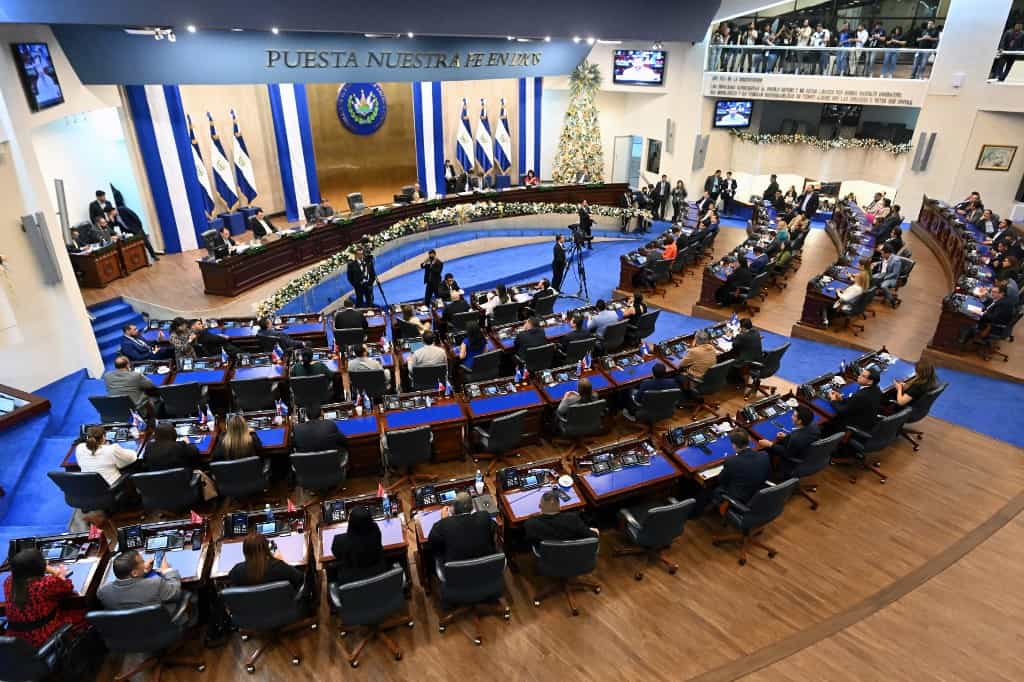Claudia Juana Rodríguez de Guevara, a largely unknown official to Salvadorans, assumes the role of interim president this Friday, replacing Nayib Bukele, who will focus on seeking reelection after obtaining leave from Congress.
Proposed by Bukele and confirmed by the Legislative Assembly to govern for the next six months while he is campaigning for the February 4 elections, where he is a favorite due to his “war” against gangs, Rodríguez de Guevara was ratified by Congress on Thursday night by 67 votes against 11. She has not appeared in public since then, and no swearing-in ceremony has taken place, but the approved decree stipulates she must govern from Friday the 1st.
Aged 42, Rodríguez de Guevara has worked with Bukele for a decade, starting when he was mayor. She has a “bachelor’s degree in business administration” and a “technical accounting” degree, according to a curriculum published on an official portal, but Salvadorans know virtually nothing about her.
According to the same curriculum, she was the financial manager of the Presidency and held similar positions in the municipalities of Nuevo Cuscatlán (2012-2015) and San Salvador (2015-2018) when Bukele led those municipalities.
In December 2021, Bukele appointed her as president of the board of directors of the Municipal Works Directorate, responsible for the construction and maintenance of streets in the country’s municipalities.
Will Power Be Released?
During his leave, Bukele “will not be able to exercise decision-making functions such as the political and administrative leadership of the state apparatus, monopoly of the use of state force,” as approved by Congress, dominated by the ruling party.
He also will not be able to participate in the “law-making processes,” which will be the responsibility of his replacement. However, analysts believe that Bukele will direct the reins of power from the shadows.
“Only a naive person would believe that (Rodríguez de Guevara) is going to govern, he (Bukele) is not going to let go of power, he will be involved in reviewing what his ministers do. Asking for leave is just a mere appearance,” said political analyst Carlos Araujo.
“Bukele is not going to let anyone ruin what he has done, and that’s why he proposed her, she is part of his circle of control,” said economist and analyst Julia Martínez.
Controversial Reform
In September 2021, the Constitutional Chamber of the Supreme Court of Justice, through an interpretation of the Constitution, enabled Bukele to seek a new successive term, which generated controversy as the constitution did not allow reelection.
In Thursday’s session, several ruling party deputies spoke, praising Bukele’s achievements, who has high popularity for the crusade against gangs initiated 20 months ago, but there were also criticisms from opponents. “One cannot give a license for something unconstitutional,” said deputy Claudia Ortiz, of the centrist party Vamos.
While the deputies debated, Bukele attended his last official act as acting president: laying the foundation stone of the future National Stadium on the outskirts of San Salvador, donated by China.
Its construction will take three years and cost 100 million dollars. Two weeks ago, Bukele inaugurated a modern library – which cost 54 million dollars – donated by China in the capital, another sign of China’s growing presence in Central America, which concerns the United States.
Breaking Schemes
With the ability to communicate ideas and a frequent user of social networks, the 42-year-old president has broken traditional political schemes since winning the 2019 elections, ending the bipartisanship that had prevailed since the end of the civil war (1980-1992).
His popularity grew from March 2022 when he declared war against gangs that maintained territorial control and financed themselves through extortion and contract killings, after which the country began to regain tranquility.
Supported by a state of emergency that allows arrests without a judicial order and criticized by human rights organizations, the government has jailed more than 73,000 alleged gang members, although about 7,000 innocent people were released, according to authorities.
“We have literally become from the most insecure country in the world to the safest country in Latin America,” Bukele boasted at the event at the future National Stadium.






